Croatian Parliament
Croatian Parliament Hrvatski sabor | |
|---|---|
| 11th Sabor | |
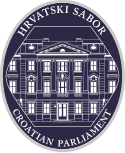 Seal of the Croatian Parliament | |
| Type | |
| Type | |
| History | |
| Founded | 1273 (first documented session) 1990 (contemporary) |
| Leadership | |
Deputy Speakers | since 16 May 2024 |
| Structure | |
| Seats | 151 |
 | |
Political groups | Government(67)
Supported by(11) Opposition(72) |
| Elections | |
| Openparty-list proportional representation | |
Last election | 17 April 2024 |
Next election | On or before 2028 |
| Meeting place | |
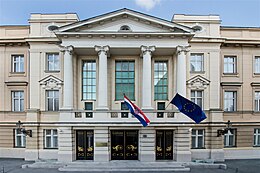 | |
| Parliament Palace,Zagreb | |
| Website | |
| sabor.hr | |
TheCroatian Parliament(Croatian:Hrvatski sabor) or theSabor[A]is theunicamerallegislatureofCroatia.Under the terms of theCroatian Constitution,the Sabor represents thepeopleand is vested with legislative power. The Sabor is composed of 151 memberselectedto a four-year term on the basis of direct, universal and equalsuffragebysecret ballot.Seats are allocated according to theCroatian Parliament electoral districts:140 members of the parliament are elected in multi-seatconstituencies.An additional three seats are reserved for thediasporaandCroatsinBosnia and Herzegovina,whilenational minoritieshave eight places reserved in parliament.[2]The Sabor is presided over by aSpeaker,who is assisted by at least one deputy speaker (usually four or five deputies).
The Sabor's powers are defined by theConstitutionand they include: defining economic, legal and political relations in Croatia, preservation and use of its heritage and entering into alliances. The Sabor has the right to deploy theCroatian Armed Forcesabroad, and it may restrict some constitutional rights and liberties in wartime or in cases of imminent war or following natural disasters. The Sabor amends the borders of Croatia or the Constitution, enacts legislation, passes the state budget, declares war and decides on cessation of hostilities, adopts parliamentary resolutions and bylaws, adopts long-term national security and defence strategies, implements civil supervision of the armed forces and security services, callsreferendums,performs elections and appointments conforming to the constitution and applicable legislation, supervises operations of theGovernmentand other civil servicesresponsibleto the parliament, grants amnesty for criminal offences and performs other duties defined by the constitution.
The oldest Sabor with extant records was held inZagrebon 19 April 1273. This was the Sabor ofSlavonia,and not ofCroatiaandDalmatia.The earliest recorded Sabor of theKingdom of Croatia and Dalmatiadates to 1350 in Podgrađe nearBenkovac.[3]TheParliament session held in 1527 in Cetin affirmedtheHouse of Habsburgas Croatian rulers. After this, the Sabor became a regular gathering of the nobility, and its official title gradually stabilised by 1558 as the Parliament of theKingdom of CroatiaandSlavonia.Since 1681, it has been formally called the Diet of theKingdom of Croatia, Dalmatia and Slavonia.In 1712, the Sabor once again invoked its prerogative to select the ruler, supporting what later became thePragmatic Sanction of 1713.Since the mid-1800s, the Sabor has regularly met and its members have been regularly elected. Exercising its sovereignty once again on 29 October 1918, the Sabor decided on independence fromAustria-Hungaryand formation of theState of Slovenes, Croats and Serbswhich later joined theKingdom of Serbs, Croats and Slovenes.The Sabor did not meet between 1918 and 1945, except for an unelected Sabor convened in 1942. The Sabor initially reconvened as an assembly ofState Anti-fascist Council for the National Liberation of Croatia(ZAVNOH) in 1943 and evolved since through various structures following the November 1945 elections and several changes of the constitution. After thefirst multi-party electionssinceCommunist ruleand the adoption of the 1990 constitution, the Sabor wasbicameral(Chamber of Representatives and Chamber of Counties) until 2001, when constitutional amendments changed it to the unicameral form currently used.
Historical background
[edit]
The Sabor, in its various forms, has represented the identity and opinions ofCroatsfrom thedietsof the 9th century nobility to the modern parliament. The oldest Sabor whose records are preserved was held inZagrebon 19 April 1273[citation needed]as theCongregatio Regni totius Sclavonie generalisorUniversitas nobilium Regni Sclavoniae(General diet of the entire kingdom of Slavonia or Community of the nobility of the kingdom of Slavonia). Its decisions had legislative power.[4]The 1527 Parliament decision was a decisive event of fundamental importance for the extension and confirmation of Croatian statehood, as described by the Constitution of Croatia.[5]The parliament freely choseFerdinand Iof theHouse of Habsburgas the new ruler of Croatia, after centuries ofCroatian personal union with Hungary.[4][6]Following the entry into the Habsburg Monarchy, the Sabor became a regular noble diet, and its official title gradually stabilised by 1558 to the Parliament of the Kingdom of Croatia and Slavonia. Since 1681 it has been formally styled as theCongregatio Regnorum Croatiae, Dalmatiae et SlavoniaeorGeneralis Congregatio dominorum statuum et ordinum Regni(Diet of the Kingdom of Croatia, Dalmatia and Slavonia or General Diet of the Estates of the Realm).[4]In 1712, the Sabor once again invoked its prerogative to select the ruler, supporting what later became thePragmatic Sanction of 1713and electingMaria Theresa of Austriaasmonarch.[4]This event is also specified by the Constitution of Croatia as a part of the foundation of unbroken Croatian statehood from theMiddle Agesto the present.[5]
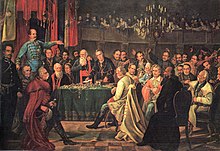
In 1848, first modern Diet with the elected representatives was summoned (even high nobility and high dignitaries of the Catholic and Orthodox church remainedex officiomembers). The Sabor operated as the legislative authority during the existence of theKingdom of Croatia-Slavonia(1848/1868 – 1918). Theevents of 1848in Europe and in theAustrian Empirerepresent a watershed in Croatian society and politics, given their linkage to theCroatian national revivalthat strongly influenced and significantly shaped political and social events in Croatia from that point onwards to the end of the 20th century. At the time, the Sabor advocated the implicit severance of ties with theKingdom of Hungary,emphasizing links to otherSouth Slaviclands within the empire. A period ofneo-absolutismwas followed by theAustro-Hungarian Compromise of 1867andCroatian–Hungarian Settlement,recognizing the limited independence of Croatia, together with reinvigorated claims of uninterrupted Croatian statehood.[7]Two political parties that evolved in the 1860s and contributed significantly to this sentiment were theParty of Rights (1861–1929)and thePeople's Party.They were opposed by theNational Constitutional Partythat was in power for most of the period between the 1860s and 1918, which advocated closer ties between Croatia and Hungary. Another significant party formed in this era was theSerb People's Independent Party,which would later form theCroat-Serb Coalitionwith the Party of Rights and other Croat and Serb parties. This Coalition ruled Croatia between 1903 and 1918. The Croatian Peasant Party (HSS), established in 1904 and led byStjepan Radić,advocated Croatian autonomy but achieved only moderate gains by 1918.[7]In theKingdom of Dalmatia,two major parties were thePeople's Party,a branch of the People's Party active in theKingdom of Croatia-Slavonia,and theAutonomist Party,which advocated maintaining the autonomy of Dalmatia, opposing the People's Party's demands for unifying Croatia-Slavonia and Dalmatia. The Autonomist Party was also linked toItalian irredentism.
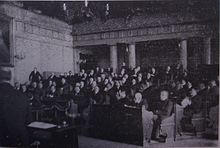
By the 1900s, the Party of Rights also made electoral gains in Dalmatia.[8]In Dalmatia, the Autonomists won the first three elections held there in 1861, 1864 and 1867, while those from 1870 to 1908 were won by the People's Party. In 1861–1918, there were 17 elections in Croatia-Slavonia and 10 in Dalmatia.[7]
Exercising its sovereignty once again on 29 October 1918, the Sabor decided on independence fromAustria-Hungaryand formation of theState of Slovenes, Croats and Serbs.The council of the newly established state voted to form theKingdom of Serbs, Croats and Slovenes;however, the Sabor never confirmed that decision.[5][4]The1921 constitutiondefining the new kingdom as aunitary state,and the abolition of historical administrative divisions, effectively ended Croatian autonomy for the time and the Sabor did not convene until the 1940s.[9]TheCvetković–Maček Agreementof August 1939 established the autonomousProvince of Croatia,orBanovinaof Croatia, in which the Yugoslav government retained control of defence, internal security, foreign affairs, trade, and transport, while other matters were left to the Croatian Sabor and a crown-appointedban(Viceroyor governor).[10]Before any elections were held, the establishment was made obsolete with the beginning ofWorld War IIand the establishment of theIndependent State of Croatiawhich banned all political opposition.[11]In 1942, three sessions of an unelected Sabor were held in the Independent State of Croatia; these were held between 23 February and 28 December 1942, when it was formally dissolved. The assembly had no real power as the state was under the direct rule of (the fascist)Ante Pavelić.[4]
The post-World War II Sabor developed from theNational Anti-fascist Council of the People's Liberation of Croatia(ZAVNOH), formed in 1943.[4]In 1945, ZAVNOH transformed itself into the National Sabor of Croatia, preserving the continuity of Croatian sovereignty.[12]After the war, the Communists ran unopposed in the 1945 elections;[13]all opposition parties boycotted the elections due to coercion and intimidation by theOZNAsecret police and theCommunist Party,aimed at eliminating electoral dissent.[14]Once in power, the Communists introduced a single-party political system, with theCommunist Party of Yugoslavia(from 1952 theLeague of Communists of Yugoslavia) as the ruling party and theCommunist Party of Croatia(from 1952 theLeague of Communists of Croatia) as a branch party.[15]In January 1990, the Communist Party fragmented along national lines, with the Croatianfactiondemanding a looser federation.[16]
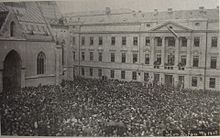
During Communist rule, the Sabor went from a unicameral parliament as specified by the 1947 constitution, to bicameral in 1953, changing again in 1963 to as many as five chambers and then to three in 1974. The constitutional amendments of 1971 established the Presidency of the Sabor, and one of its functions becamerepresentingCroatia,[4]as the Yugoslav constituent republics were essentially viewed as nation-states generally surrendering only their foreign and defence policies to the federation; the federal bodies were no longer independent of, but instead formed by, the republics (after 1974 constitution, this role was taken by newly formed Presidency of the Republic elected by the Sabor).[17]
The first political party founded in Croatia since the beginning of the Communist rule was the Croatian Social Liberal Party (HSLS), established on 20 May 1989, followed by the Croatian Democratic Union (HDZ) on 17 June 1989. In December,Ivica Račanbecame the head of the reformed Communist party. At this time, the Communist party decided to cancel political trials, release political prisoners and endorse amulti-party political system.The Civil Organisations Act was formally amended to allow multiple political parties on 11 January 1990, legalising the new parties. By the time of the first round of thefirst multi-party elections,held on 22 April 1990, there were 33 registered parties. There were single-seat constituencies for half of the seats and a single nationwide constituency (through election lists) for the remaining seats.[18]Still, the most relevant parties and coalitions were the renamed Communist party (the League of Communists of Croatia — Party of Democratic Changes), the HDZ and theCoalition of People's Accord(KNS), which included the HSLS, led byDražen Budiša,and the HSS, which resumed operating in Croatia in December 1989.[19][20]Therunoff election,open to any candidate receiving at least 7% of the vote,[18]was held on 6 May 1990. The HDZ led by Franjo Tuđman won ahead of the reformed Communists and the KNS. The KNS, led by the former leaders of theCroatian Spring(Savka Dabčević-KučarandMiko Tripalo), soon splintered into individual parties. On 8 October 1991, Croatia's declaration of independence took effect.[21]The HDZ maintained a parliamentary majority until the 2000 parliamentary elections when it was defeated by the SDP led by Račan.[22]The HDZ returned to power in the2003 elections,while the SDP remained the largest opposition party.[23]
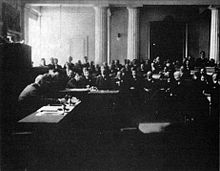
Parliamentary powers
[edit]The Parliamentrepresentsthe citizens of theRepublic of Croatia;it acts as the country'slegislature.It convenes regularly in two sessions each year, from 15 January to 15 July and from 15 September to 15 December; however, extraordinary sessions may be called by thePresident of Croatia,thegovernment of Croatiaor a majority of the parliamentary members. The sessions are open to the public. The parliament decides throughsimple majorityvotes, except in issues pertaining to (constitutionally recognised)ethnic minorities in Croatia,the constitution, electoral legislation, the scope and operational methods of governmental bodies and local government; in these cases, decisions are made bytwo-thirds majorityvotes. The parliament may authorise the government to enact regulations dealing with matters normally covered by parliamentary acts. Such regulations expire one year after the authorisation is issued. The authorisation does not apply to matters that must be decided upon by a parliamentary two-thirds vote. Legislation enacted by the parliament is either endorsed by the President of Croatia within eight days or referred to theConstitutional Court of the Republic of Croatia.[5]
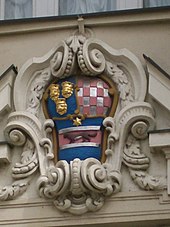
The members are grantedparliamentary immunity;their criminal prosecution is possible only after parliamentary consent, except for crimes with five or more years of imprisonment mandated. The parliament may appoint investigative commissions for any matter of public interest.[5]
The Croatian parliament's powers are defined by the Constitution of Croatia. These include: defining economic, legal and political relations in the Republic of Croatia; preservation of Croatia's natural and cultural heritage and its utilisation; and forming alliances with other states. The parliament has the right to deployCroatian Armed Forcesabroad. It may also restrict constitutional rights and liberties in wartime or in cases of imminent war or following natural disasters, although that constitutional provision is limited to specific rights—right to life, prohibition of torture, cruel or denigrating conduct or punishment, upholding ofhabeas corpusand freedoms of thought, conscience and religious views. In addition, in those circumstances parliamentary members' terms may be extended. (As these rights are defined by the constitution, the decision would require a two-thirds majority. Since Croatia never declared a state of war during thebreakup of Yugoslavia,this option has not been exercised in practice.[24]) The parliament reserves the right to amend the borders of Croatia. The parliament decides on constitutional amendments, enacts legislation, passes the state budget, declares war and decides on the cessation of hostilities, adopts declarations of policy of the parliament, adopts national defence strategy, representing a long-term defence resource planning document,[25]and national defence strategy, which defines bases for establishment and implementation of institutions, measures and activities in response to general security issues and specific challenges and threats to Croatia,[26]implements civil supervision of the armed forces and security services, callsreferendums,performs elections and appointments conforming to the constitution and applicable legislation, supervises operations of the government (headed by thePrime Minister of Croatia) and other civil services responsible to the parliament, grants amnesty for criminal offences and performs various other duties defined by the constitution.[5]Becoming the Prime Minister of Croatia requires majority support in the parliament.[27]
The Government isresponsibleto the parliament; some other institutions, such as theCroatian National Bankand the State Audit Office, also report directly to the parliament. The parliament appoints anombudsmanto promote and protect human rights and liberties established by the constitution, parliamentary legislation and treaties adopted by Croatia. The ombudsman is appointed for an eight-year term; the ombudsman's work is independent. The ombudsman, as well as all other persons authorised to act on behalf of the parliament, is granted parliamentary immunity equal to that enjoyed by parliamentary members.[5]
Working bodies
[edit]The table below lists all 29 of the main committees in the 11th Sabor.[28]
| Committee | Chair(s) | Term | Refs | ||
|---|---|---|---|---|---|
| 1 | Committee on theConstitution,Rules of Procedureand Political System | Ivan Malenica(HDZ) | 2024– | [29] | |
| 2 | LegislationCommittee | Krunoslav Katičić (HDZ) | 2024– | [30] | |
| 3 | European AffairsCommittee | Jelena Miloš (M!) | 2024– | [31] | |
| 4 | Foreign AffairsCommittee | Andro Krstulović Opara(HDZ) | 2024– | [32] | |
| 5 | Domestic PolicyandNational SecurityCommittee | Ranko Ostojić(SDP) | 2024– | [33] | |
| 6 | DefenceCommittee | Arsen Bauk(SDP) | 2024– | [34] | |
| 7 | FinanceandCentral BudgetCommittee | Boris Lalovac(SDP) | 2024– | [35] | |
| 8 | Committee on theEconomy | Igor Peternel (DP) | 2024– | [36] | |
| 9 | TourismCommittee | Sanja Radolović (SDP) | 2024– | [37] | |
| 10 | Committee onHumanand NationalMinority Rights | Milorad Pupovac(SDSS) | 2024– | [38] | |
| 11 | JudiciaryCommittee | Nikola Grmoja(MOST) | 2024– | [39] | |
| 12 | Labour, Retirement System and Social Partnership Committee | Mišo Krstičević (SDP) | 2024– | [40] | |
| 13 | HealthandSocial PolicyCommittee | Ivana Kekin (M!) | 2024– | [41] | |
| 14 | Committee on the Family, Youth and Sports | Vesna Vučemilović (Ind.) | 2024– | [42] | |
| 15 | Committee onCroats outside the Republic of Croatia | Zdravka Bušić(HDZ) | 2024– | [43] | |
| 16 | War veteransCommittee | Josip Đakić (HDZ) | 2024– | [44] | |
| 17 | Physical Planningand Construction Committee | Predrag Štromar(HNS) | 2024– | ||
| 18 | EnvironmentandNature ConservationCommittee | Dušica Radojčić (M!) | 2024– | ||
| 19 | Education,ScienceandCultureCommittee | Vesna Bedeković(HDZ) | 2024– | ||
| 20 | AgricultureCommittee | Marijana Petir(Ind.) | 2024– | ||
| 21 | Committee onRegional Developmentand European Union Funds | Ivana Mujkić (DP) | 2024– | ||
| 22 | Committee onMaritime Affairs,TransportationandInfrastructure | Stipo Mlinarić (DP) | 2024– | ||
| 23 | Elections, Appointments and Administration Committee | Pero Ćosić (HDZ) | 2024– | ||
| 24 | Petitions and Appeals Committee | Željko Jovanović(SDP) | 2024– | ||
| 25 | Interparliamentary Co-operation Committee | Kristina Ikić Baniček(SDP) | 2024– | ||
| 26 | Committee onInformation,Computerisationandthe Media | Josip Borić (HDZ) | 2024– | ||
| 27 | Gender EqualityCommittee | Marija Lugarić (SDP) | 2024– | ||
| 28 | Local and Regional Self-government Committee | Miro Bulj (MOST) | 2024– | ||
| 29 | Mandate-ImmunityCommission (MIP) | Robert Jankovics (Ind.) | 2024– | ||
The members of Sabor can be members of one or more of its committees. The working body has a president, vice-president and members of the working body from the ranks of representatives, unless otherwise specified in the Rules of Procedure. The composition of the working body generally corresponds to the party composition of the Parliament.[45]
The parliamentary committees debate and discuss initiatives and motions ahead of the enactment of laws, other regulations and other matters within the authority of the Sabor. Prior to the debate on any bill proposed by the government or deputies at the Sabor session, the chairperson of the competent working body and the Legislation Committee are obligated to place that bill on the agenda of the session of the working body and conduct a debate on it. Furthermore, the Committees hold hearings on the petitions and proposals submitted to Sabor by citizens.[46]
Members of the Croatian Parliament engage in various inter-parliamentary activities. Deputies form permanent delegations tointer-parliamentary organizations,such as theParliamentary Assembly of the Council of EuropeandNATO Parliamentary Assembly.[47]
Speaker of the Parliament
[edit]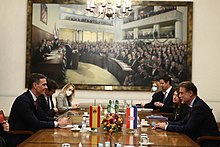
The members of the parliament elect the Speaker of the Parliament and one or more deputy speakers by a simple majority vote.[5]
Since the first multi-party elections held after the start of Communist rule, there have been eight speakers of the parliament; the first five, executing the office until constitutional amendments in March 2001, were also speakers of the Chamber of Deputies (since the parliament was bicameral at the time).[48]As of 16 May 2024,Gordan Jandroković(HDZ) is the 12th Speaker of the Sabor. There are five deputy speakers in the current parliament:Željko Reiner(HDZ),Ivan Penava(DP) andFurio Radin(Ind.), Sabina Glasovac (SDP) and Siniša Hajdaš Dončić (SDP).
The speaker of the parliament becomes the acting President of the Republic in the event of the death, resignation or incapacitation[B]of the President of Croatia, as specified by the constitution.[5]This situation occurred after the death ofFranjo Tuđmanin 1999, whenVlatko Pavletićbecame the acting president.[49]After the2000 parliamentary elections,the role was transferred toZlatko Tomčić,who filled the office untilStjepan Mesićwaselected President of Croatia in 2000.[50]
| Name | From | To | Party | |
|---|---|---|---|---|
| Žarko Domljan | 30 May 1990 | 7 September 1992 | HDZ | |
| Stjepan Mesić | 7 September 1992 | 24 May 1994 | HDZ | |
| Nedjeljko Mihanović | 24 May 1994 | 28 November 1995 | HDZ | |
| Vlatko Pavletić | 28 November 1995 | 2 February 2000 | HDZ | |
| Zlatko Tomčić | 2 February 2000 | 22 December 2003 | HSS | |
| Vladimir Šeks | 22 December 2003 | 11 January 2008 | HDZ | |
| Luka Bebić | 11 January 2008 | 22 December 2011 | HDZ | |
| Boris Šprem | 22 December 2011 | 30 September 2012 | SDP | |
| Josip Leko | 10 October 2012 | 28 December 2015 | SDP | |
| Željko Reiner | 28 December 2015 | 14 October 2016 | HDZ | |
| Božo Petrov | 14 October 2016 | 4 May 2017 | MOST | |
| Gordan Jandroković | 5 May 2017 | Incumbent | HDZ | |
| Source:Former Speakers of the Parliament | ||||
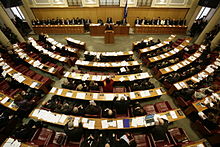
Composition
[edit]This article needs to beupdated.(October 2020) |
TheConstitution of Croatiamandates that the parliament consists of at least 100 members and no more than 160 members, elected by a directsecret ballotfor four-year terms. Parliamentary elections are held within 60 days following the term's expiration or parliamentary dissolution (the latter takes place with a parliamentary no-confidence vote or if the parliament fails to approve a state budget within 120 days after the government submits one for approval), and a new parliament must convene within 20 days after the elections.[5]
As specified by the current electoral legislation in Croatia, 140 members of the Parliament are elected in multi-seatconstituencies,up to 3 members are chosen byproportional representationto represent Croatian citizens residing abroad and 8 members represent ethnic and national communities or minorities (including "undeclared", "unknown", or otherwise other than constitutionally recognized groups).[51]
The model of parliamentary elections is based on theChristmas Constitution(1990), but has been significantly modified four times since then, most recently in 1999.[52] The most recent substantial revision of the election law came in February 2015, and was partially upheld by theConstitutional Courtin September 2015. An element of preferential voting was introduced by letting voters choose not only for a list of candidates, but also a single member of the same list. If the percentage of votes for a candidate exceeds 10%, they are elected as if it was anopen listsystem. The list ranking is maintained for those candidates that do not meet this quota.[53]
Previous parliamentary elections
[edit]
Since 1990, seven parliamentary elections have been held in Croatia. The elections held in 1990 were the first multi-party elections following 45 years of Communist rule. The Parliament had three chambers at the time; the candidates ran for all 80 seats in the Social-Political Council of Croatia, all 116 seats to the Municipalities Council of Croatia and all 160 seats to the Associated Labour Council of Croatia. The first round of the election saw a turnout of 85.5%; the turnout for the runoff election was 74.8%. In this election, the Croatian Democratic Union (HDZ) won 205 seats and the Social Democratic Party of Croatia won 107. Between then and 2007, five parliamentary elections were held for the Chamber of Deputies (Croatian:Zastupnički dom) of the parliament or the unicameral parliament since (in 1992, 1995, 2000, 2003 and 2007). Starting with the 1992 elections, the number of seats first in the Chamber of Deputies, and then in the unicameral parliament, were significantly variable: ranging from 127 in 1995 to 153 in 2007. In the Croatian parliamentary elections held since 1992, when the number of seats in the parliament was limited to below 160, only 5 parties have won 10 seats or more in any one parliamentary election. These were the HDZ, the Croatian Peasant Party (HSS), the Croatian People's Party – Liberal Democrats (HNS), theCroatian Social Liberal Party(HSLS) and the SDP.[23]
Several political parties, besides the HDZ, HSS, HNS, HSLS and SDP, have won parliamentary seats in the elections since 1990. These have been (in alphabetical order): theAlliance of Primorje-Gorski Kotar(previously named Rijeka Democratic Alliance), theCroatian Christian Democratic Union,the Croatian Citizen Party, the Croatian Democratic Alliance of Slavonia and Baranja, theCroatian Democratic Peasant Party,theCroatian Independent Democrats,the Croatian Party of Pensioners, theCroatian Party of Rights,the Croatian Party of Rights dr. Ante Starčević, theDalmatian Actionparty, the Democratic Centre party, the Istrian Democratic Assembly, theLiberal Party,theParty of Liberal Democrats,theSerb Democratic Party,theSlavonia-Baranja Croatian Party,and theSocial Democratic Action of Croatiaparty.[23] The following parties have won special seats reserved for representatives elected by[C]minorities(also in alphabetical order): the Bosnian Democratic Party of Croatia, theDemocratic Union of Hungarians of Croatia,theGerman People's Union – National Association of Danube Swabians in Croatia,the Independent Democratic Serb Party, theParty of Democratic Action of Croatia,and theSerb People's Party.[23]
In addition, someindependentshave won seats through party lists by being elected as an independent running on a party's list, andIvan Grubišić's list of non-partisan candidates has won seats as well.[23]Since individuals (not parties) possess parliamentary seats once won, there also can be (and have been) instances where seat-holders became independent or switched to another political party.[54]
| Parliamentary elections overview since 1990(Tricameral parliament(1990), Chamber of Representatives (Lower house 1990–2001), unicameral parliament (2001–present)) | |||
|---|---|---|---|
| Election | Turnout | Results | Cabinet(s) |
| 1990 | * | 1st assembly | Cabinet of Stjepan Mesić,Cabinet of Josip Manolić,Cabinet of Franjo Gregurić |
| 1992 | 75.6% | 2nd assembly | Cabinet of Hrvoje Šarinić,Cabinet of Nikica Valentić |
| 1995 | 68.8% | 3rd assembly | Cabinet of Zlatko Mateša |
| 2000 | 70.5% | 4th assembly | Cabinet of Ivica Račan I,Cabinet of Ivica Račan II |
| 2003 | 61.7% | 5th assembly | Cabinet of Ivo Sanader I |
| 2007 | 59.5% | 6th assembly | Cabinet of Ivo Sanader II,Cabinet of Jadranka Kosor |
| 2011 | 54.3% | 7th assembly | Cabinet of Zoran Milanović |
| 2015 | 60.8% | 8th assembly | Cabinet of Tihomir Orešković |
| 2016 | 52.6% | 9th assembly | Cabinet of Andrej Plenković I |
| 2020 | 46.4% | 10th assembly | Cabinet of Andrej Plenković II |
| 2024 | 61.89% | 11th assembly | Cabinet of Andrej Plenković III |
| Source: State Election Commission[23] | |||
(*)In the first multi-party elections in 1990 three parliamentary chambers were elected in a two-round majoritarian system: the Social-Political Council, the Council of Municipalities and the Council of Associated Labour. Turnout for the election each chamber varied. It was as follows: Social-Political council (84.5% in first round in all constituencies, 74.82% in second round in 51 of 80 constituencies), Council of Municipalities (84.1% in first round, 74.6% in second round) and Council of Associated Labour (76.5% in first round in all constituencies, 66% in second round in 103 of 160 constituencies).
Chamber of Counties
[edit]Under the Constitution of Croatia adopted in 1990, the parliament becamebicameral.The Chamber of Deputies had been elected a few months earlier; its members enacted legislation creating a newterritorial organisation of Croatia.This reorganisation includedcountiesthat were to be represented by the new Chamber of Counties (Croatian:Županijski dom). Thefirst electionof members of the chamber was on 7 February 1993, with each of the counties acting as a three-seat constituency using proportional representation. In addition, as per Article 71 of the 1990 constitution, the President of Croatia was given the option of appointing up to 5 additional members of the Chamber of Counties; it could have as many as 68 members.[55]Thesecond and last electionfor the Chamber of Counties of the parliament was on 13 April 1997.[23][56]The Chamber of Counties was abolished by a 2001 constitutional amendment.[57]
| Speakers of the Chamber of Counties | ||||
|---|---|---|---|---|
| Name | Start | End | Party | |
| Josip Manolić | 22 March 1993 | 23 May 1994 | HDZ | |
| Katica Ivanišević | 23 May 1994 | 28 March 2001 | HDZ | |
| Seats won in parliamentary elections by individual parties Chamber of Counties elections 1993–1997 | ||||||
|---|---|---|---|---|---|---|
| Party | 1993 | 1997 | ||||
| Croatian Democratic Union | 39 | 42 | ||||
| Croatian Party of Rights | – | 2 | ||||
| Croatian Peasant Party | 5 | 9 | ||||
| Croatian People's Party | 1 | – | ||||
| Croatian Social Liberal Party | 16 | 7 | ||||
| Istrian Democratic Assembly | 3 | 2 | ||||
| Social Democratic Party of Croatia | 1 | 4 | ||||
| Independent | 3 | 2 | ||||
| Source: State Election Commission[23][56] | ||||||
Publication of proceedings
[edit]The Croatian Parliament publishes all its decisions inNarodne Novine,the official gazette of the Republic of Croatia. Article 90 of the constitution requires publication of all acts and other regulations in the gazette before they are legally binding.[5]Narodne Novine is available through a paid subscription as print,[58]or for free online.[59]Parliamentary debates and other proceedings are the subject of news coverage bymedia of Croatia,andSaborska televizijawas set up in 2007 in addition as anIPTVchannel broadcasting allplenary sessionsof the parliament.[60][61]Finally, the Parliament's Public Relations Department publishes a news bulletin available to all institutions and citizens of Croatia through a print paid subscription,[62]and online for free.[63]
Parliamentary location
[edit]
The Sabor has convened in Zagreb since the 13th century, but there was no special building for this until the 18th century. Previously, sessions of the Sabor had been held in private houses, in royal estates inGradecand at the bishop's residence.[64]During theCroatian-Ottoman Wars,which severely disrupted the functioning of the Croatian kingdom, the Sabor's sessions became so impractical that the 1685 session decided to have the ban appoint a six-member committee to do the work of the Sabor when sessions were not possible. This body became operational in 1689 and had its mandate extended through the entire 18th and into the 19th century. ThisConferentia Regnorum Croatiae, Dalmatiae et Slavoniaeconsisted of the ban, two high clerics and three or four noblemen, and it would bring forward numerous acts; it met in various places, usually Zagreb orVaraždin,but also inČiče,Ludbreg,Kerestinec,Vienna,Želin,Bratislava,Klenovnik,Slunj,Glina,Petrinja,Rasinja,PtujandBudim.[65]
In 1731, the government purchased houses at the site of the present building and construction of a new building started the next year. The Sabor first met in the new building on 6 May 1737. The building was originally designed to accommodatearchives,the courtand the office of the ban; however, the government ofZagreb Countymoved in as well in 1765. The ban's office, the court and the archives moved out of the building in 1807, when a building acrossSt. Mark's Squarewas bought to accommodate them. Subsequently, the newly purchased building was namedBanski dvoriafter its new primary purpose of housing the ban and his office. The Zagreb County government purchased buildings adjacent to the parliament in 1839 and commissioned a new building at the site. It was completed in 1849; in the meantime, the Sabor had to convene elsewhere; it met in a theatre building located on a corner of the square. The theatre building later became theZagreb City Hall.[64]
In 1907, the government of the Kingdom of Croatia-Slavonia bought the parliament building and adjacent structures, starting construction of the present parliament building. At the same time, the Zagreb County government moved its headquarters elsewhere, leaving the Sabor as the sole user. The present parliament building was completed in 1911 using the design of Lav Kalda and Karlo Susan.[64]
Due to the renovation works on the Sabor Palace following the events of the2020 Zagreb earthquake,in 2024 the parliament has decided to temporarily relocate to theČrnomerecdistrict, in the Petar Zrinski Barracks, the site of theCroatian Military Academy "Dr. Franjo Tuđman".[66]The exact date of the relocation and of the beginning of the reconstruction are not yet known.
See also
[edit]Notes
[edit]- ^Note: the Croatian wordSaboris used only for the Croatian parliament. For the parliaments of other countries, Croatian speakers use the wordsparlament(parliament) orskupština(assembly).[1]
- ^Incapacitation is determined by the Constitutional Court of Croatia upon a request by the government; the constitution itself does not specify exactly what is incapacitation.
- ^The representatives themselves are not required to be minorities, but are historically very likely to be.
- ^
- HDZ(55)
- HDS(1)
- IndependentMarijana Petir(1)
- ^Czech and Slovak minority representative
- ^
- HSLS(2)
- IndependentVladimir Bilek[b](1)
- ^
- HNS-LD(1)
- Independents(2)
- Armin Hodžić(Albanian, Bosniak, Montenegrin, Macedonian and Slovenian minority representative)
- Veljko Kajtazi(Roma, Austrian, Bulgarian, German, Polish, Romanian, Ruthenian, Russian, Turkish, Ukrainian, Vlach and Jewish minority representative)
- ^
- Nezavisni(1)
- HSU(1)
- IndependentVesna Vučemilović (1)
- ^
- Robert Jankovics (Hungarian minority representative)
- ^
- IndependentFurio Radin(Italian minority representative)
- ^
- ^
- Igor Peternel
- Dario Zurovec
- Nino Raspudić
- Marija Selak Raspudić
- ^
- HS(1)
- PiP(1)
- IndependentJosip Jurčević(1)
- ^
- ^SDSS represents the Serbian national minority
- ^
- IDS(2)
References
[edit]- ^"Hrvatski sabor obilježava Međunarodni dan demokracije"[Croatian Parliament marks the international day of democracy] (in Croatian). Sabor. 15 September 2009. Archived fromthe originalon 7 August 2018.Retrieved10 February2012.
- ^"Knife-Edge Result Likely in Croatian Elections".Balkan Insight.6 November 2015.Retrieved7 August2020.
- ^"Zasjedanje prvog Općeg sabora Kraljevine Dalmacije i Hrvatske 1350. godine".Hrvatski sabor(in Croatian).Retrieved21 May2024.
- ^abcdefgh"Povijest saborovanja"[History of parliamentarism] (in Croatian).Sabor.Archivedfrom the original on 2 December 2010.Retrieved18 October2010.
- ^abcdefghijk"Ustav Republike Hrvatske"[Constitution of the Republic of Croatia].Narodne Novine(in Croatian). 9 July 2010.Retrieved11 October2011.
- ^Richard C. Frucht (2005).Eastern Europe: An Introduction to the People, Lands, and Culture.ABC-CLIO. pp. 422–423.ISBN978-1-57607-800-6.Retrieved18 October2011.
- ^abcStjepan Matković (April 2011)."Croatian-Slovenian relations in politics, 1848–1914: examples of mutual ties".Review of Croatian History.6(1). Croatian Institute of History: 115–132.ISSN1845-4380.Retrieved15 November2011.
- ^Šime Peričić (September 2003)."O broju Talijana/talijanaša u Dalmaciji XIX. stoljeća"[Concerning the Number of Italians/Pro-Italians in Dalmatia in the 19th Century].Radovi Zavoda za povijesne znanosti HAZU u Zadru(in Croatian) (45).Croatian Academy of Sciences and Arts:327–355.ISSN1330-0474.Retrieved15 November2011.
- ^"Parlamentarni izbori u Brodskom kotaru 1923. godine"[Parliamentary Elections in the Brod District in 1932].Scrinia Slavonica(in Croatian).3(1). Croatian Institute of History – Slavonia, Syrmium and Baranya history branch: 452–470. November 2003.ISSN1332-4853.Retrieved17 October2011.
- ^Matjaž Klemenčič; Mitja Žagar (2004).The former Yugoslavia's diverse peoples: a reference sourcebook.ABC-CLIO.pp. 121–123.ISBN978-1-57607-294-3.Retrieved17 October2011.
- ^R.J.B. Bosworth(2009).The Oxford handbook of fascism.Oxford University Press.p. 431.ISBN978-0-19-929131-1.
- ^"Važniji datumi iz povijesti saborovanja"[Important dates in the history of Sabor] (in Croatian).Sabor.Archived fromthe originalon 3 December 2010.Retrieved17 February2012.
- ^Davorin Rudolf; Saša Čobanov (June 2009)."Jugoslavija: unitarna država ili federacija povijesne težnje srpskoga i hrvatskog naroda – jedan od uzroka raspada Jugoslavije"[Yugoslavia: A Unitary State or a Federation (Conflicting historical tensions – one of the causes of the dissolution of Yugoslavia)].Zbornik Radova Pravnog Fakulteta U Splitu(in Croatian).46(2).University of Split,Faculty of Law: 287–317.ISSN0584-9063.Retrieved15 November2011.
- ^Andrew Hammond (2004).The Balkans and the West: constructing the European other, 1945–2003.Ashgate Publishing. pp. 1–4.ISBN978-0-7546-3234-4.Retrieved11 February2012.
- ^Marina Štambuk-Škalić (April 2003)."Prilog poznavanju institucija: Sabor Narodne Republike Hrvatske, saziv 1953–1963"[Contribution to the History of Institutions: Parliament of the People's Republic of Croatia, Convocation 1953–1963].Arhivski vjesnik(in Croatian) (45). Croatian State Archive: 83–102.ISSN0570-9008.Retrieved15 November2011.
- ^Davor Pauković (1 June 2008)."Posljednji kongres Saveza komunista Jugoslavije: uzroci, tijek i posljedice raspada"[Last Congress of the League of Communists of Yugoslavia: Causes, Consequences and Course of Dissolution].Časopis Za Suvremenu Povijest(in Croatian).1(1). Centar za politološka istraživanja: 21–33.ISSN1847-2397.Retrieved11 December2010.
- ^Dejan Jović(2009).Yugoslavia: a state that withered away.Purdue University Press. pp. 77–82.ISBN978-1-55753-495-8.Retrieved12 February2012.
- ^abRobert Podolnjak (September 2008)."Hrvatsko izborno zakonodavstvo: moguće i nužne promjene"[Croatian electoral legislation: possible and necessary amendments].Zbornik Radova Pravnog Fakulteta U Splitu(in Croatian).45(2). University of Split, Faculty of Law: 305–343.ISSN0584-9063.Retrieved12 February2012.
- ^"Statut"[Constitution] (in Croatian).Croatian Peasant Party.19 December 2009.Retrieved15 November2011.
- ^Šime Dunatov (December 2010)."Začetci višestranačja u Hrvatskoj 1989. godine"[The Origins of the Multi-Party System in Croatia in 1989].Radovi Zavoda za povijesne znanosti HAZU u Zadru(in Croatian) (52). Croatian Academy of Sciences and Arts: 381–397.ISSN1330-0474.Retrieved15 November2011.
- ^"Ceremonial session of the Croatian Parliament on the occasion of the Day of Independence of the Republic of Croatia".Official web site of the Croatian Parliament.Sabor. 7 October 2004. Archived fromthe originalon 14 March 2012.Retrieved29 July2012.
- ^"Prethodne vlade RH"[Previous governments of the Republic of Croatia] (in Croatian). Croatian Government. Archived fromthe originalon 23 November 2011.Retrieved10 November2011.
- ^abcdefghi"Arhiva izbora"[Elections Archive] (in Croatian). State Election Commission. Archived fromthe originalon 31 October 2011.Retrieved13 November2011.
- ^Eduard Šoštarić (11 December 2006)."Višak generala HV-u prepreka za NATO"[Surplus of Croatian Army generals is an obstacle to NATO] (in Croatian).Nacional (weekly).Archivedfrom the original on 9 May 2013.Retrieved12 February2012.
- ^"Stragegija obrane (NN 33/02)"[Defence strategy (OG 33/02)] (in Croatian).Ministry of Defence (Croatia).Archived fromthe originalon 11 May 2013.Retrieved10 February2012.
- ^"Stragegija nactionalne sigurnosti Republike Hrvatske (NN 33/02)"[National security strategy of the Republic of Croatia (OG 33/02)] (in Croatian).Ministry of Defence (Croatia).Archived fromthe originalon 3 October 2012.Retrieved10 February2012.
- ^Ivanka Toma (22 December 2011)."Novi članovi Banskih dvora – Milanovićevih 21"[New members of Banski Dvori – Milanović's 21].Večernji list(in Croatian).Retrieved23 December2011.
- ^"Committees of Croatian Parliament".sabor.hr.Croatian Parliament.Retrieved30 May2024.
- ^"Odbor za Ustav, Poslovnik i politički sustav".sabor.hr(in Croatian). Croatian Parliament.Retrieved30 May2024.
- ^"Odbor za zakonodavstvo".sabor.hr(in Croatian). Croatian Parliament.Retrieved30 May2024.
- ^"Odbor za europske poslove".sabor.hr(in Croatian). Croatian Parliament.Retrieved30 May2024.
- ^"Odbor za vanjske poslove".sabor.hr(in Croatian). Croatian Parliament.Retrieved30 May2024.
- ^"Odbor za unutarnju politiku i nacionalnu sigurnost".sabor.hr(in Croatian). Croatian Parliament.Retrieved30 May2024.
- ^"Odbor za obranu".sabor.hr(in Croatian). Croatian Parliament.Retrieved30 May2024.
- ^"Odbor za financije i državni proračun".sabor.hr(in Croatian). Croatian Parliament.Retrieved30 May2024.
- ^"Odbor za gospodarstvo".sabor.hr(in Croatian). Croatian Parliament.Retrieved30 May2024.
- ^"Odbor za turizam".sabor.hr(in Croatian). Croatian Parliament.Retrieved30 May2024.
- ^"Odbor za ljudska prava i prava nacionalnih manjina".sabor.hr(in Croatian). Croatian Parliament.Retrieved30 May2024.
- ^"Odbor za pravosuđe".sabor.hr(in Croatian). Croatian Parliament.Retrieved30 May2024.
- ^"Odbor za rad, mirovinski sustav i socijalno partnerstvo".sabor.hr(in Croatian). Croatian Parliament.Retrieved30 May2024.
- ^"Odbor za zdravstvo i socijalnu politiku".sabor.hr(in Croatian). Croatian Parliament.Retrieved30 May2024.
- ^"Odbor za obitelj, mlade i sport".sabor.hr(in Croatian). Croatian Parliament.Retrieved30 May2024.
- ^"Odbor za Hrvate izvan Republike Hrvatske".sabor.hr(in Croatian). Croatian Parliament.Retrieved30 May2024.
- ^"Odbor za ratne veterane".sabor.hr(in Croatian). Croatian Parliament.Retrieved30 May2024.
- ^"Radna tijela".sabor.hr.Croatian Parliament.Retrieved30 May2024.
- ^"POSLOVNIK HRVATSKOGA SABORA (PROČIŠĆENI TEKST)"(PDF).sabor.hr(in Croatian). Croatian Parliament.Retrieved30 May2024.
- ^"Permanent delegations".sabor.hr.Croatian Parliament.Retrieved30 May2024.
- ^"Prethodni predsjednici Sabora"[Previous Speakers of the Parliament] (in Croatian). Sabor. Archived fromthe originalon 3 March 2016.Retrieved17 November2011.
- ^"Akademik Vlatko Pavletić, predsjednik Sabora od 1995. do 2000. godine"[Academician Vlatko Pavletić, Speaker of the Parliament from 1995 to 2000] (in Croatian). Sabor. Archived fromthe originalon 2 November 2013.Retrieved17 November2011.
- ^"Zlatko Tomčić, predsjednik Sabora od 2000. do 2003. godine"[Zlatko Tomčić, Speaker of the Parliament from 2000 to 2003] (in Croatian). Sabor. Archived fromthe originalon 18 January 2012.Retrieved17 November2011.
- ^"About the Parliament".Sabor. Archived fromthe originalon 6 July 2016.Retrieved14 October2011.
- ^"Izborni modeli za parlamentarne izbore".Izborna enciklopedija(in Croatian). State Election Committee (Državno izborno povjerenstvo). 2008.Retrieved31 December2015.
- ^"Croatian parliament backs changes to electoral law".europeanvoice.com. 26 February 2015.Retrieved26 February2015.
- ^"Strukturna dinamika hrvatskog parlamenta"[Structural Dynamics of the Croatian Parliament].Politička Misao(in Croatian).36(3).University of Zagreb,Faculty of Political Science: 151–174. September 1999.ISSN0032-3241.Retrieved13 November2011.
- ^"Ustav Republike Hrvatske (NN 056/1990)"[Constitution of the Republic of Croatia (NN 056/1990)] (in Croatian). HIDRA.Retrieved11 February2012.
- ^ab"Rezultati izbora za županijski dom Sabora Republike Hrvatske 1997. godine"[Results of Election for the Chamber of Counties of the Parliament of the Republic of Croatia in Year 1997](PDF)(in Croatian). State Election Commission. Archived fromthe original(PDF)on 2 November 2013.Retrieved13 November2011.
- ^"History of Croatian Constitutional Judicature".Croatian Constitutional Court.Archived fromthe originalon 15 April 2012.Retrieved9 November2011.
- ^"Poštovani pretplatnici!"[Dear subscribers!] (in Croatian).Narodne Novine.Archived fromthe originalon 15 July 2012.Retrieved12 February2012.
- ^"Službeni dio"[Official section] (in Croatian).Narodne Novine.Retrieved12 February2012.
- ^"Saborska televizija dostupna i na Internetu"[Parliament television also available on the internet] (in Croatian).Nova TV (Croatia).25 January 2007.Retrieved6 January2012.
- ^"Sjednice sabora"[Sessions of the Parliament] (in Croatian). Sabor. Archived fromthe originalon 25 September 2012.Retrieved6 January2012.
- ^"Public Relations Department".Sabor. Archived fromthe originalon 2 December 2010.Retrieved6 January2012.
- ^"Izvješća Hrvatskoga sabora – tjedni pregled"[Croatian Parliament reports – weekly review] (in Croatian). Sabor. Archived fromthe originalon 10 May 2013.Retrieved11 February2012.
- ^abc"Povijest saborske palače"[History of the parliament palace] (in Croatian). Sabor. Archived fromthe originalon 4 May 2012.Retrieved30 December2011.
- ^"Hrvatska kraljevinska konferencija iz 1729. donijela prvi proračun hrvatskoga kraljevstva".Saborske povijesne zanimljivosti(in Croatian). Croatian Parliament. Archived fromthe originalon 19 January 2012.Retrieved30 December2011.
- ^""Objavljeni svi detalji o preseljenju Sabora: u zgrade na Črnomercu uložit će se oko dva milijuna eura""(in Croatian). Telegram.hr.Retrieved24 February2024.
Further reading
[edit]- Mašić, Barbara (2010)."Stranačka struktura Hrvatskog sabora 1990–2010".Pravnik(in Croatian).44(89): 67–82.Retrieved15 January2020.
External links
[edit]- Official websiteof the Croatian Parliament(in Croatian)
- Official websiteof the Croatian Parliament(in English)
- Internet Televisionof the Croatian Parliament(in Croatian)

